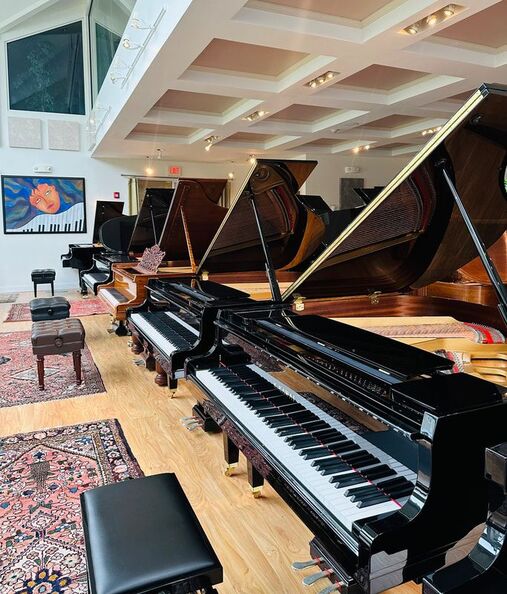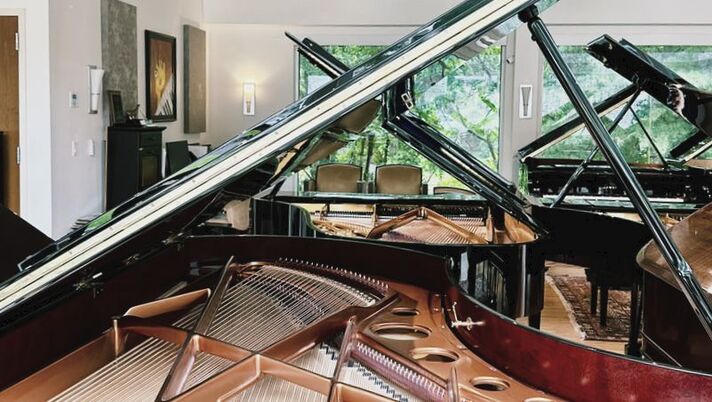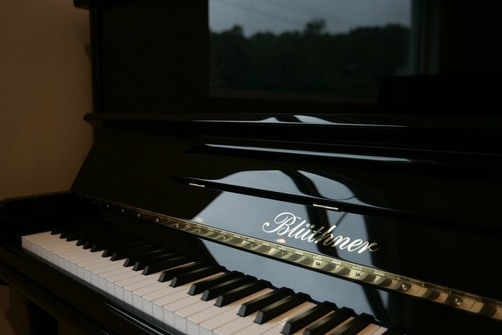- PRE OWNED PIANOS -
Used Pianos - buying a pre-owned piano in CT and NY
Allegro Pianos has a large selection of used and pre-owned pianos.
Please contact us for the most updated inventory information or browse a selection of our used pianos at the bottom of this page.
'Used piano' can mean different thingsWhen we receive pre-owned pianos, they are inspected, repaired as needed and prepared for sale.
Some used pianos are of relatively recent vintage and in original mint condition. Our technicians tune, voice and regulate these pianos so that they perform at the level of a new piano and at times, even better than when they were new. This group of pianos can present both good value and performance. However, the terms 'used,' 'restored' or 'reconditioned' can mean different things and at times, such pianos represent lesser values and diminished performance. Of course, almost all used pianos are described to be in 'excellent condition' -- but this is rarely the case -- so investing the time to learn about the differences is important. The piano is a machine that deteriorates with time. Understanding this can save piano shoppers considerable time, money and aggravation. A good analogy in this case would be to compare the useful life of a piano to that of a car, but about three times longer. For the most useful information to fit your needs, it's best to visit the showroom. But since this subject is extremely important we'll provide here a guide with general advice. |
How long do used pianos last?Pianos that are 30 - 35 years of age usually require considerable investment to keep them functioning the way they were intended to. This can add up to thousands of dollars and result in a situation where the cost of the work exceeds what a brand new piano of similar quality would cost.
This often renders older pianos monetary worthless, or almost worthless. Of course, lower build quality, 'high mileage' or improper maintenance/ environmental conditions can all accelerate the deterioration of a piano. However, even if the instrument is played very little and kept well maintained deterioration still occurs due to the enormous pressures the piano is designed to carry and the live materials it is built with. Only a very select group of grand pianos that reach 30 - 35 years of age or beyond have real monetary value. Otherwise, when older pianos are sold by a dealer, what the consumer is paying for are mostly expenses for moving, basic cleaning/tuning/voicing/regulation and a profit margin. The expenses dictate that even pianos which the dealer paid noting for, or even charged a fee to the previous owner for removal from their home, can be sold for a couple of thousands of dollars. Upon resale, of course, these instrument have no value at all so the money invested in them is completely lost. When purchased privately, or obtained for free, the buyers often have to pay for these expenses privately. The cost of these expenses is higher for a private person than it is for a dealer, and so the buyer often learns that the 'bargain' piano they got for free, is a 'money pit' with no value, and a thirst for expenses they were not prepared to pay for, and which it makes little sense to invest in leaving them in a lose/lose situation. Either they pour money into it and never recuperate even a small fraction of their investment as they pianos value would still be similar to what it was prior to the work, or, they invest only what they 'have to' for moving and the most obvious repairs, and remain with a very compromised instrument which out of the two is usually the worst of the two scenarios. It is the worst scenario because most often, consumers look for older pianos because they costs little money to obtain initially. They are doing so based on a common market misconception, believing that 'professionals need great pianos, while children and beginners just need something simple to bang on'. Unfortunately, the opposite is true. Professionals or very experienced players know how to play, how to adapt to any instrument and the music is within them. If the piano has various maladies they will know how to deal with it. Beginner piano players on the other hand, and especially children, get frustrated quickly and a piano that doesn't sound like much, or perform as it intended to is likely to reduce their level of enthusiasm and progress in lessons. Choosing a too old piano for a student is rarely a path for success and very often a much lesser value in spite of very low price. |
How to determine the true age of a pre-owned piano?Each piano has a serial number that can be found on it.
It is quite common for people to describe their used pianos, when attempting to sell or give these away, as much younger than they really are. Years seem to pass by without noticing, and at times. the seller is not the original owner so they may recall how long the piano, which they purchased used, had been in their possession rather than its true age. Given that pianos deteriorate it is important to know how old they really are. At Allegro Pianos we will be happy to verify the age of a piano, free of charge, if you call our office at (203) 968-8888 and provide the serial number. Even if the serial number is not accessible to you, we may be able to determine the likely age and whether or not it may have any potential value just by the brand name and a short description of the piano. Why older pianos are almost always described as in 'excellent condition'?Most people are unaware that their pianos require work, or would need costly work very soon. They do not have the expertise to inspect the soundboard or remove the action. Even if they did, they would rarely know to interpret what they had seen or what the implications are.
Given that the deterioration of pianos is a gradual process, and as they owner rarely plays on other pianos, if at all (as the instrument may have been played by a family member years ago) the owner lacks comparison and doesn't usually notice the degradation so even with the best of intents, their 'excellent condition' assessment is most often misguided. Asking a teacher about the shape of the piano is also rarely useful as they may know how to play the instrument, but lack the expertise in the mechanics, how long parts will last, how a piano is likely to handle transition to a new environment, or how costly repairs that are needed either now or in the near future would be. In a short analogy, knowing how to drive a car doesn't make one an expert in internal combustion engine. Then what about asking a piano technician about what is needed? Well yes, a good technician may know what needs to be repaired...but sticking with the same analogy, it is a little like asking a mechanic if hi can 'fix it'. while the mechanic most often can, he may not always have the expertise of knowing what's in the market and whether trying to fix an old clunker so it can get a few more miles is the best option or value. A visit to allegro Pianos, will give one a comprehensive view of the best options and costs. What is the value of this used piano?Instruments that are of decent initial build quality and less than 20 years old are likely to represent good value. At this point, its current condition plays a greater role in determining its value, so without inspecting the piano we will only be able to provide a possible range.
Once more, with approximate age and a short description we at Allegro Pianos will gladly provide you with an estimated value free of charge over the phone. On the other hand, if the piano is found to be greater than 30 years old, its age becomes the most important factor, and while we are likely to be able to provide only a broader range of value over the phone, it may be enough to determine whether the expense needed to inspect the piano is worth considering at all. This is accurate in almost all instances but, of course, there are few exceptions . A small number of higher quality grand pianos may justify the initial cycle of work that is expected when the piano reaches about 35 years of age. A simple guideline is that none of the mass produced pianos made in China, Korea, Indonesia or Japan justify such an investment today or are likely to justify it in the future, hence their expected useful lifespan is about 35 years of age. An even smaller group of pianos may justify complete rebuilding, a more costly process that is usually necessary if the initial cycle of work was done when the piano reached the age of about 35, or when it reaches the age of about 50 if that cycle of work wasn't done. If considerable work, amounting to many thousands of dollars, was done on an older piano it may or may not be worth more, and this will require proper inspection and more information. |
So how much is this 'restored,' 'rebuilt,' 'reconditioned' or 'heirloom' piano really worth?
If all is done correctly, and it is a home size grand of one of the few piano brands worth restoring, and there are no external factors diminishing the piano's core value... the amount of money put into the work will roughly represent the value of the piano when purchasing from a dealer.
Never, ever, is it recommended to 'restore' a piano for purpose of resale. If you have a piano that you would like to sell, even one that is monetarily worth restoring, and you are being advised to 'invest money' into it so that you can sell it for more, don't do it!
The person advising you is either grossly misinformed or is trying to take advantage of the situation.
Let's take a common example of a home size, 5'7" Steinway model M piano originally made in 1925, or 1965, for that matter.
If one were to call a few piano dealers in the NYC area and describe the piano to be in 'excellent condition,' but with original soundboard and no major work being done to it in the past 35 years, it will quickly be determined that none of these dealers will pay more than about $3,500 for this piano and most likely even less.
Once a dealer gets such a piano, they will determine what work will go into it and price it accordingly. Complete rebuilding, including the installation of a new soundboard, pinblock, upper and lower action, and refinishing may cost anywhere between less than $20,000 to upwards of $35,000 depending on the quality of work and parts.
The piano, after the work is done, can be sold by the same dealer 'restored' or 'rebuilt' for pretty much the cost of the work, plus the cost of the piano and moves. It means that dealers make money on the restoration of the piano which, naturally, will cost them less.
Other dealers may choose to keep the original soundboard and perform partial reconditioning work on the piano (more in line with what it should have received when it was 35 years of age). In this case, the work will cost less but the dealer will still be able to sell it for about the cost of the restoration, plus the core value of the piano. This generally means that the consumer pays less but gets less, and very often with an older piano, much less, since the partial work adds little to the true value of the piano and after a relatively short time, the piano is plagued with maladies and its value is, once again, below $3,500.
Now if this older Steinway grand is worth so little, how much do you think that a Wurlitzer, Hardman or Baldwin spinet that was purchased originally for less than a third of the price, and for which the restoration expenses are about the same, is really worth?
Obviously, not much, but should you want to determine the true value of the piano, call a few piano dealers that work with such used pianos and see how much they will be willing to purchase such an instrument for (rather than sell it to you)!
In the majority of instances the answer one will get is that the piano has no value and that the dealer will charge money for removal. In some instances, the dealer may be willing to pick up the piano for free or pay a few hundred dollars for it, but that is all.
The reason for this is simple. In most cases the cost of proper repair exceeds the cost of such a similar quality new piano, and the piano is likely to cost much more in preparation and maintenance, hence making this instrument more of a 'money pit' rather than a good value.
Most importantly, such instruments often end up being used by families with children, and the students, especially young ones and beginners, are discouraged from playing the piano having to deal with continued maladies (such as sticky keys, rings and rattles) and a lack of the necessary basic qualities of tone and touch.
Please note that almost all upright pianos and the majority of grand pianos that are older than 35 years old fall into the category of 'not justifying the cost of the work'.
But even when younger, say about 25 years of age, given that the fixed expenses are the same (such as for moving, tuning, voicing and regulating) and the work cycle is near, such pianos rarely represent good values.
Where to get information about used pianos?
The used piano market can be confusing and, if not navigated properly, can lead to frustration and undue expense.
It contains both some of the best and worst values in the industry.
If you'd like to learn more about pianos and the used piano market in particularly, please contact us and set a time for a visit.
Although our inventory of used pianos is extensive, we cannot guarantee that you will find the piano of your dreams here. We can, however, provide information which we are certain you will find invaluable to your particular situation, and that will provide you, as a consumer looking to buy a piano, the tools needed to navigate the used piano market with confidence and success.
It contains both some of the best and worst values in the industry.
If you'd like to learn more about pianos and the used piano market in particularly, please contact us and set a time for a visit.
Although our inventory of used pianos is extensive, we cannot guarantee that you will find the piano of your dreams here. We can, however, provide information which we are certain you will find invaluable to your particular situation, and that will provide you, as a consumer looking to buy a piano, the tools needed to navigate the used piano market with confidence and success.
BROWSE OUR USED PIANOS INVENTORY:



